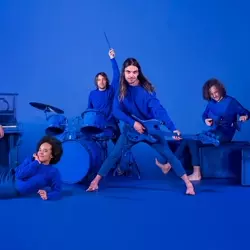 Saskwatch
SaskwatchMelbourne's Saskwatch may be identified as a cult neo-soul collective. But, following the heavier grooves of 2015's stunning sleeper Sorry I Let It Come Between Us, they're now going fully psychedelic with Manual Override. "If you haven't listened to our last album, this will kind of come as a shock sound-wise," advises frontwoman Nkechi Anele.
Anele is seated in Marios, Fitzroy's legendary pre-hipster cafe, beside Liam McGorry - Saskwatch's primary songwriter (and multi-instrumentalist). The two typically rep Saskwatch in interviews - the group rounded-out by Rob Muinos (guitar), Olaf Scott (keys), Tom Pettit (bass) and newcomer Sam Raines (drums). Today McGorry enjoys coffee while Anele discreetly savours a BYO mandarin.
The music media has mythologised Saskwatch as uni students who regularly busked outside Flinders Street Station. But, McGorry counters, that phase has been "blown a little bit out of proportion". In fact, Saskwatch crystallised after local DJ Vince Peach offered them a residency at Cherry Bar's soul night. McGorry started presenting the then-covers band with original material. And Anele replaced an earlier vocalist. In 2012, a nine-piece Saskwatch debuted with the festive Leave It All Behind via Northside Records - the indie label promoting Melbourne's soul boom. In the meantime, the acclaimed live performers headed overseas. Saskwatch hit 2012's Edinburgh Fringe Festival, their schedule so gruelling that Anele damaged her voice. "I had to go and have vocal therapy to get back to being able to talk - let alone sing," she recalls. The next year, they played Glastonbury.
For that ambitious third album, Sorry I Let It Come Between Us (SILICBU), Saskwatch journeyed to Philadelphia to record with producer Scott McMicken - the guitarist from the indie-rock combo Dr Dog. However, the exchange wasn't what the Aussies expected. "Philly was great and not so great, in a lot of respects," McGorry begins. "The experience of it was awesome. We were basically in a warehouse for two weeks - staying in there and recording in there and just hanging out in there. So that was great fun. But it wasn't really that conducive to making the best record, as we thought it was gonna be." Regardless, Anele suggests that SILICBU was "a good turning point". "We'd reached a stage where the band knew what it wanted to sound like. We didn't really need somebody from outside of the band to come in and try and make an album different to how we'd already thought about it." Returning home, Saskwatch underwent significant line-up changes - losing their horn section and drummer. McGorry eventually determined to produce Manual Override with Muinos. Unusually, Saskwatch didn't roadtest songs (excepting Then There's You), keeping the process fresh.
Don't miss a beat with our FREE daily newsletter
McGorry acknowledges that Manual Override - led by the fuzz-rock December Nights - is far removed from neo-soul. Yet Saskwatch never perceived themselves as strictly belonging to any genre - or scene. "The first album was a pretty soul-influenced kind of thing," McGorry concedes. "For a while, we did love soul music - and love making soul music. [But] I guess it's always been just one of a number of influences." His references for Manual Override were those hybrid - and mutable - musicians Beck and The Avalanches.
Being a smaller unit has freed Saskwatch up to experiment, explains Anele. "Because of this dramatic change that we've had, with the loss of an entire horn section, one of the first things that we realised is that there was so much space for us individually within the band to create sound. I think that's probably why the more psychedelic sound is now coming to the forefront, because there is the room to move it there, whereas before we would still try to maintain an even balance between all the people that were in the band - and, when you have nine people, that's a bit hard." Indeed, Manual Override actually has string arrangements. "I think that brought a really new dimension and dynamic to the album." Mind, Saskwatch's "constant" is Anele's soulful delivery.
The six members juggle the band with other commitments. McGorry is one of four who moonlights in Dorsal Fins (he previously gigged in Eagle & The Worm). By day, he works at a record store. Anele hosts a triple j show, Roots 'n All, and co-runs The Pin - a website exploring bicultural Australian identity. She's a casual librarian.
Saskwatch have previewed Manual Override live in Melbourne and Sydney - with a full tour planned for spring. They're aiming for international dates in 2018. Anele has despaired that Australian musicians struggle for recognition - until they receive global validation. Even then, our mainstream lags. "I was at WOMAD[elaide] at the start of the year and [Hiatus Kaiyote singer] Nai Palm was in the crowd," Anele tells. "When she's in the crowd of people from her home country - no one knew who she was. When she stepped backstage, with people literally from all over the world, they were like, 'Oh my god - how are you here and walking around?'"















